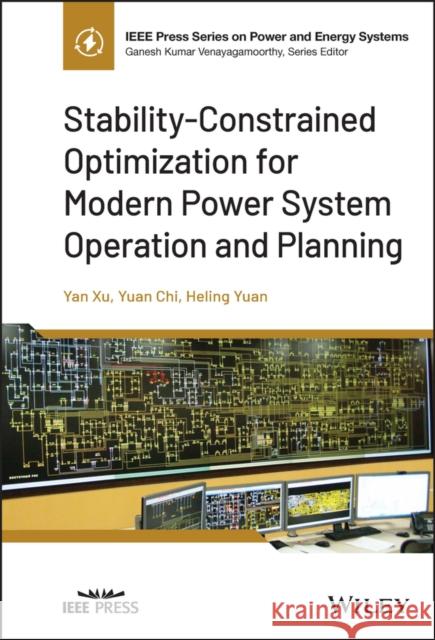Stability-Constrained Optimization for Modern Power System Operation and Planning » książka



Stability-Constrained Optimization for Modern Power System Operation and Planning
ISBN-13: 9781119848868 / Angielski / Twarda / 2023
Stability-Constrained Optimization for Modern Power System Operation and Planning
ISBN-13: 9781119848868 / Angielski / Twarda / 2023
(netto: 503,88 VAT: 5%)
Najniższa cena z 30 dni: 519,44
ok. 30 dni roboczych.
Darmowa dostawa!
About the Authors xviiForeword xixPreface xxiPart I Power System Stability Preliminaries 11 Power System Stability: Definition, Classification, and Phenomenon 51.1 Introduction 51.2 Definition 61.3 Classification 61.4 Rotor Angle Stability 71.5 Voltage Stability 101.6 Frequency Stability 121.7 Resonance Stability 141.8 Converter-Driven Stability 162 Mathematical Models and Analysis Methods for Power System Stability 192.1 Introduction 192.2 General Mathematical Model 192.3 Transient Stability Criteria 202.4 Time-Domain Simulation 212.5 Extended Equal-Area Criterion (EEAC) 232.6 Trajectory Sensitivity Analysis 263 Recent Large-Scale Blackouts in the World 333.1 Introduction 333.2 Major Blackouts in the World 33Part II Transient Stability-Constrained Dispatch and Operational Control 454 Power System Operation and Optimization Models 494.1 Introduction 494.2 Overview and Framework of Power System Operation 494.3 Mathematical Models for Power System Optimal Operation 514.4 Power System Operation Practices 595 Transient Stability-Constrained Optimal Power Flow (TSC-OPF): Modeling and Classic Solution Methods 655.1 Mathematical Model 655.2 Discretization-based Method 665.3 Direct Method 685.4 Evolutionary Algorithm-based Method 706 Hybrid Method for Transient Stability-Constrained Optimal Power Flow 796.1 Introduction 796.2 Proposed Hybrid Method 806.3 Technical Specification 836.4 Case Studies 857 Data-Driven Method for Transient Stability-Constrained Optimal Power Flow 977.1 Introduction 977.2 Decision Tree-based Method 987.3 Pattern Discovery-based Method 1037.4 Case Studies 1108 Transient Stability-Constrained Unit Commitment (TSCUC) 1338.1 Introduction 1338.2 TSC-UC model 1348.3 Transient Stability Control 1358.4 Decomposition-based Solution Approach 1378.5 Case Studies 1409 Transient Stability-Constrained Optimal Power Flow under Uncertainties 1559.1 Introduction 1559.2 TSC-OPF Model with Uncertain Dynamic Load Models 1579.3 Case Studies for TSC-OPF Under Uncertain Dynamic Loads 1649.4 TSC-OPF Model with Uncertain Wind Power Generation 1709.5 Case Studies for TSC-OPF Under Uncertain Wind Power 1759.6 Discussions and Concluding Remarks 18910 Optimal Generation Rescheduling for Preventive Transient Stability Control 19510.1 Introduction 19510.2 Trajectory Sensitivity Analysis for Transient Stability 19610.3 Transient Stability Preventive Control Based on Critical OMIB 19810.4 Case Studies of Transient Stability Preventive Control Based on the Critical OMIB 20210.5 Transient Stability Preventive Control Based on Stability Margin 21310.6 Case Studies of Transient Stability Preventive Control Based on Stability Margin 21711 Preventive-Corrective Coordinated Transient Stability-Constrained Optimal Power Flow under Uncertain Wind Power 23311.1 Introduction 23311.2 Framework of the PC--CC Coordinated TSC-OPF 23411.3 PC--CC Coordinated Mathematical Model 23511.4 Solution Method for the PC--CC Coordinated Model 23911.5 Case Studies 24312 Robust Coordination of Preventive Control and Emergency Control for Transient Stability Enhancement under Uncertain Wind Power 25512.1 Introduction 25512.2 Mathematical Formulation 25512.3 Transient Stability Constraint Construction 26012.4 Solution Approach 26112.5 Case Studies 264Part III Voltage Stability-Constrained Dynamic VAR Resources Planning 28113 Dynamic VAR Resource Planning for Voltage Stability Enhancement 28513.1 Framework of Power System VAR Resource Planning 28513.2 Mathematical Models for Optimal VAR Resource Planning 28513.3 Power System Planning Practices 28814 Voltage Stability Indices 29314.1 Conventional Voltage Stability Criteria 29314.2 Steady-State and Short-term Voltage Stability Indices 29714.3 Time-Constrained Short-term Voltage Stability Index 30115 Dynamic VAR Resources 31115.1 Fundamentals of Dynamic VAR Resources 31115.2 Dynamic Models of Dynamic VAR Resources 31416 Candidate Bus Selection for Dynamic VAR Resource Allocation 31916.1 Introduction 31916.2 General Framework of Candidate Bus Selection 32016.3 Zoning-based Candidate Bus Selection Method 32116.4 Correlated Candidate Bus Selection Method 32716.5 Case Studies 33817 Multi-objective Dynamic VAR Resource Planning 36117.1 Introduction 36117.2 Multi-objective Optimization Model 36217.3 Decomposition-based Solution Method 36517.4 Case Studies 36818 Retirement-Driven Dynamic VAR Resource Planning 37518.1 Introduction 37518.2 Equipment Retirement Model 37618.3 Retirement-Driven Dynamic VAR Planning Model 37818.4 Solution Method 38018.5 Case Studies 38119 Multi-stage Coordinated Dynamic VAR Resource Planning 38919.1 Introduction 38919.2 Coordinated Planning and Operation Model 39019.3 Solution Method 40819.4 Case Studies 41120 Many-objective Robust Optimization-based Dynamic VAR Resource Planning 42920.1 Introduction 42920.2 Robustness Assessment of Planning Decisions 43020.3 Many-objective Dynamic VAR Planning Model 43620.4 Many-objective Optimization Algorithm 43920.5 Case Studies 445Nomenclature 452References 455Index 459
Yan Xu obtained B.E. and M.E. degrees from South China University of Technology, China, and the Ph.D. from University of Newcastle, Australia, in 2008, 2011, and 2013, respectively. He conducted postdoctoral research with the University of Sydney Postdoctoral Fellowship, and then joined Nanyang Technological University (NTU) with the Nanyang Assistant Professorship. He is now an Associate Professor at the School of Electrical and Electronic Engineering, and a Cluster Director at the Energy Research Institute, Nanyang Technological University, Singapore (ERI@N). His research interests include power system stability, microgrid, and data analytics for smart grid applications. He is an Editor for IEEE Trans. Smart Grid and IEEE Trans. Power Systems.Yuan Chi received B.E. degree from Southeast University, Nanjing, China, in 2009, and the M.E. degree from Chongqing University, Chongqing, China, in 2012, and the Ph.D. degree from Nanyang Technological University, Singapore, in 2021. From 2012 to 2017, he worked as an Electrical Engineer of Power System Planning consecutively with State Grid Chongqing Electric Power Research Institute and Chongqing Economic and Technological Research Institute. He is currently a Research Associate with Chongqing University. His research interests include planning, resilience, and voltage stability of power systems.Heling Yuan received B.E., M.Sc., and Ph.D. degrees from North China Electric Power University, Beijing, China, and the University of Manchester, and Nanyang Technological University (NTU), Singapore, in 2016, 2017, and 2022, respectively. She is currently a Research Fellow at Rolls-Royce @ NTU Corporate Lab, Singapore. Her research interests include modeling, optimization, stability analysis and control of power systems.
1997-2026 DolnySlask.com Agencja Internetowa
KrainaKsiazek.PL - Księgarnia Internetowa









